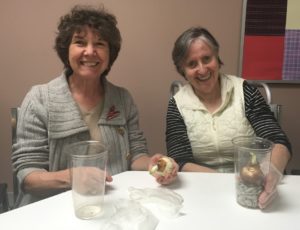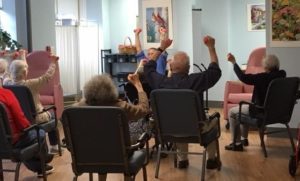Do you find yourself feeling lonely or in need of meaningful activity? Trying to stay in your home, but need some assistance? Or are you a family caregiver who needs support? If so, then adult day health services could be the answer to your questions and concerns.
 Adult day health programs help seniors and adults with disabilities stay in their homes and communities for as long as possible by providing a safe, day-time environment with meaningful and therapeutic activities like exercise or gardening, as well as opportunities to socialize with peers and make new friends. Additional services include skilled nursing care, nutritious meals, social services, and door-to-door transportation. Family caregivers benefit from respite, support, and education.
Adult day health programs help seniors and adults with disabilities stay in their homes and communities for as long as possible by providing a safe, day-time environment with meaningful and therapeutic activities like exercise or gardening, as well as opportunities to socialize with peers and make new friends. Additional services include skilled nursing care, nutritious meals, social services, and door-to-door transportation. Family caregivers benefit from respite, support, and education.
What should you look for when considering adult day health programs?
- First, learn about your options by visiting the Massachusetts Adult Day Services Association website for a list of programs in your area.
- Next, schedule a visit at the one or two centers near you, to meet with the staff and gather more information.Be sure to ask what type of programs or activity groups are offered on a daily basis, what level of training the staff have, and how they assess participants’ needs.If memory care is needed, inquire about activities designed for those who have cognitive impairment and make sure the center is secure.Your local Alzheimer’s Association chapter can also provide information about appropriate programs.
- Other things to consider include transportation services, policy for absences, and payment options.While some adult day health centers are private pay only, most accept MassHealth, State Home Care, Veterans’ Administration funds, and Senior Care Options plans (Cooperative Elder Services, Inc. accepts all of these).Sometimes private long-term care insurance policies will reimburse for adult day health.Compared to assisted living or in home care, adult day health is often more accessible and affordable.
 Once you or your loved one starts attending an adult day health program, it is important to try it out for at least two days a week, for four to six weeks, to give you an accurate sense of the program and level of adjustment to the new routine. Keep in mind that it is normal to be anxious or somewhat resistant at first, but most participants adjust well and have a good time. A quality program will recognize that seniors thrive emotionally and physically by having social connection with others, with meaning and purpose in their lives.
Once you or your loved one starts attending an adult day health program, it is important to try it out for at least two days a week, for four to six weeks, to give you an accurate sense of the program and level of adjustment to the new routine. Keep in mind that it is normal to be anxious or somewhat resistant at first, but most participants adjust well and have a good time. A quality program will recognize that seniors thrive emotionally and physically by having social connection with others, with meaning and purpose in their lives.


